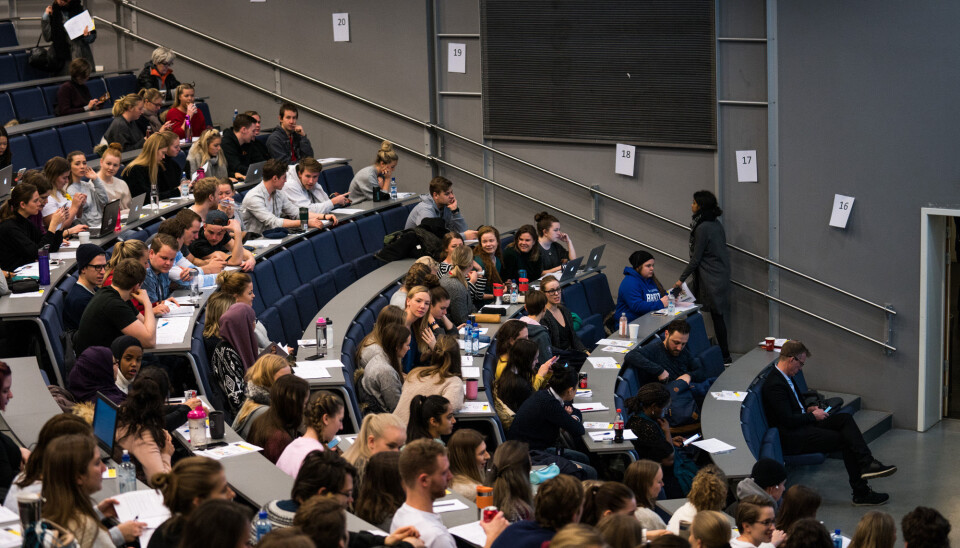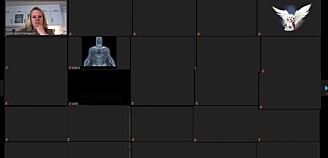Debatt ● Tom Brökel
How Covid-19 will change university lectures
By outsourcing the presentation of information to new mediums and into new forms (digital material), we don’t create substitutes for us. We make substitutes for textbooks that allow us to teach better, which will stimulate demand.

OBS! Denne artikkelen er mer enn tre år gammel, og kan inneholde utdatert informasjon.

Denne teksten er et debattinnlegg. Innholdet i teksten uttrykker forfatterens egen mening.
COVID-19 changed us. It changed how we work, how we learn, and how we teach. And, the changes will be permanent. I’ve been teaching Introduction into empirical methods for about a decade at three different universities. For the most parts, I’ve taught it in a rather traditional way: Half of it as classical in-front-of class lectures, the other half as seminars in which students worked on exercises. Student evaluation proofed that I was doing a fairly good job (for teaching statistics to geographers anyway), nevertheless, I was thinking about recording my lectures, as the content of the subject does not dramatically change from year to year. I never did. Why? I did shy away from the efforts and I also really enjoy giving lectures. I love the feeling of seeing students understand, being engaged, and develop new skills. And, the feeling of being the expert in the room getting all the attention (as much as you can get in a statistics class at least).
COVID-19 took that away. Over-night, I (like all other teachers) had to switch from offline to online teaching. With no choice giving, I had to record my material, prepared «self-explanatory» lessons, and extended the intensity of exercises. I’ve learned a lot and in particular, that I had been right all along: the efforts to move from traditional teaching to an online-centered course are massive, and in fact, even greater that I’ve ever imagined.
It is too early for a final verdict. However, students’ receptions are very positive, and their feedback highlights all the expected benefits: the material is available at any time, it can be re-watched and paused. Crucially, I think the average quality of my lecturing to be better than previous live performances in class because, and this is really important, I edit my videos and do re-takes if necessary. On the downside, my interactions with students dropped, my insights into their learning processes are more or less restricted to completed assignments, and the Zoom sessions are rather chewy because students hardly have precise questions or need further explanations.
Soon, we’ll have students back on campus and a number of questions will arise: how will courses change? What parts of the online material will I keep, and what will be replaced by on-campus interactions? How will teaching generally look like given our and the students’ experiences of the last year?
I’ve talked to a number of colleagues and many of them can’t wait to get back into the classroom and pick-up where they left more than a year ago. I believe that nothing can be further from the truth. In particular, I am convinced that we’ll experience two dramatic changes.
- The classical lecture has outlived itself.
- Teaching will become even more (human) resource intensive.
We love lectures. I think, all professors like to stand in front of a class, present their subject, present theories, empirics, implications, overarching narratives, and parts of their expertise. However, it is primarily about presenting and this can be done by recorded classes as well and, in most cases, even better. Recorded materials have advantages that are hard to ignore (see above). Some colleagues explained to me that they simply «perform better live», as they feel little energy looking at black screens. But preparing online material is not recording live lectures.
In fact, most videos of recorded lectures are terrible. Usually, the infrastructure does not allow to make blockbuster productions. In particular, when presenters are moving around, sounds and visuals suffer, black/white boards disappear, as well as slides become impossible to read. In addition, this format neglects an of the core advantages of recordings: the possibility to edit and to divide material into smaller bits and pieces. It is a challenge, but once one embraces it and starts dividing material into pieces of 10 – 20 minutes, clearer structures and arguments emerge that ultimately help students understand. Moreover, material becomes much clearer once confusing parts are removed and further explanations are added when required.
Many of us, certainly me, also need to warm-up and get into a flow when presenting live. In contrast to (recorded) live lectures, with edited recorded materials, students don’t have to make it through these first bumpy minutes. They are lost forever in the edits.
So, are recorded and edited materials are flat-out better? No. There are things that they don’t give us teachers: the feeling of being the center of attention and being of being the expert in the room. They take away this (brief) time of the day in which we are the shining light of knowledge. In this sense, recorded videos are cruel to – us – the teachers. They keep us from something we enjoy and value highly! I believe that this is strongest forces that will keep lectures alive for some more time. We don’t like to give this up. We are afraid of being left (alone) in our offices, less noticed and with much less social embrace. But that is all about us – and not about students’ learning, which it actually should be all about. History tells us that people resisting change for reasons of habitus and status usually don’t fare well. Let’s make sure that this is not happening to us.
History tells us that people resisting change for reasons of habitus and status usually don’t fare well. Let’s make sure that this is not happening to us.
This brings me to my second claim, which seems to be contradictory at first, in particular, in light of the above. If we increasingly use pre-recorded material, why would teaching become more human resource intensive? I’ve even heard many colleagues being concerned that their jobs become obsolete if classes are recorded and if (private) players enter this market and outcompete the average university by means of better produced digital material and more. Fortunately, these voices are greatly mistaken. In fact, it reminds me of the fear of workers being replaced by automated production techniques at the start of the industrial revolution. In case of the workers, rather the opposite happened.
Qualified workers are needed more than ever. What changed though is that workers have moved to more complex activities that (still) defy automatization and that no one foresaw prior to their emergence. These activities require more training (further growing demand for education!) and also generate more value (higher wages!). A good example of this is R&D that is more human capital intensive today than ever before. I predict that the same will happen with teaching. Once we have finished «automatizing» the presentation of information (formerly known as «lecture») into clever designed digital materials and videos, we will be able to redirect our resources towards actually helping students to learn.
This implies teaching being problem- and challenge-based, guiding group work, giving feedback and engage in discussions. This way of teaching is much more effective implying that students’ learning will improve massively and, in consequence, the overall effectiveness of teaching resources.
However, such type of teaching is over-proportionally more time and effort intensive than preparing and giving lectures. Each interaction with students is unique, each learning situation is special. Teachers can’t simply reel down a standard scheme. We will have to engage and participate in students’ learning. We have to provide more elaborated and more profound feedback as well explanations because students are already (or can expected to be) knowledgeable of the basics, which they obtained from consuming the digital materials. This is only possible by investing greater cognitive efforts and small-group environments, which, simply spoken, mean more teaching resources. Given the clear benefits on the side of students, they will demand and seek such type of teaching and not opt for purely digital offers - and we will be happy (and lucky) to deliver.
By outsourcing the presentation of information to new mediums and into new forms (digital material), we don’t create substitutes for us. We make substitutes for textbooks that allow us to teach better, which will stimulate demand. We will be busier than ever creating new, challenging, and unique learning experiences. It will demand so much more from us than lectures ever did. Given that this will also bring us closer to students’ learning successes and their personal growth, I am optimistic that it will also be much more rewarding than taking center stage for 45 minutes.
In sum, Covid has the potential to reform higher education differently than many seem to suspect.
For my Introduction into empirical methods course, it means that students will continue working with the online material. But in parallel the real learning and teaching will take place!
In sum, Covid has the potential to reform higher education differently than many seem to suspect. Most noticeably:
- Students’ will learn more than ever in more effective ways.
- Online materials will be just one tool amongst many and primarily compete with textbooks.
- Classes will shrink in size to enable collaborative, problem-based, and participatory learning.
- Teaching will become more resource intensive and requiring additional investments.
- Teaching will be (emotionally) more rewarding and more enjoyable for both, students and teachers.







Nylige artikler
PST-sjef advarer mot spioner på Arctic Frontiers
Oxford, Yale, Stanford på topp i rangering. For «dei mest privilegerte»
Informatikkbyggets lekende prins
8 av 10 universiteter med røde tall i Frankrike: «Dette er en alvorlig advarsel»
Forlot først akademia på grunn av midlertidigheten
Mest leste artikler
Stenger ute alle søkere fra Iran, Russland, Kina og Nord-Korea
Det renner inn med KI-genererte søknader. — Som en flodbølge av KI-skvip
Ønsker å bli kvitt navnetradisjonen. Vil ikke være professor emerita
Sykepleierstudenten har en dødelig sykdom. Mens han kan, vil han hjelpe andre
Student ble utestengt i to år etter tre tvilsmeldinger